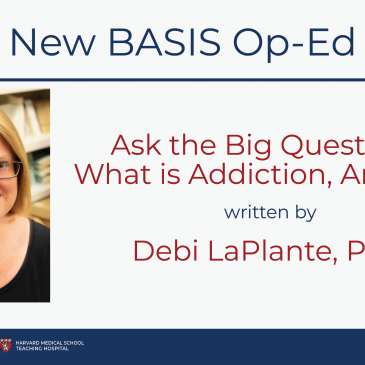Editor’s note: Dr. Debi LaPlante is the former Senior Editor of The BASIS and current Director of the Division on Addiction. This op-ed is part of our Special Series in Honor of Dr. Howard Shaffer.
 In a data-driven profession, it can be easy to lose sight of the big picture. But, as Sir William Bragg noted, “the important thing in science is not so much to obtain new facts as to discover new ways of thinking about them.” This quote set the stage for Shaffer et al. ‘s 2004 paper proposing to understand addiction not as a property of chemicals, but instead as a syndrome. In short, this proposal asked whether it is possible that addiction is a collection of potential signs and symptoms that have shared etiology and is expressed opportunistically. This helped open the door to understanding behaviors, such as gambling, from the perspective of addictive behavior. But, this gets too far ahead in the story. Backing up, one of the most important things about this paper is the type of question it raises – one of Howard’s favorite kinds – a question that is challenging, pushes boundaries, and stimulates reflection. In this paper Howard asked, what is addiction, anyway?
In a data-driven profession, it can be easy to lose sight of the big picture. But, as Sir William Bragg noted, “the important thing in science is not so much to obtain new facts as to discover new ways of thinking about them.” This quote set the stage for Shaffer et al. ‘s 2004 paper proposing to understand addiction not as a property of chemicals, but instead as a syndrome. In short, this proposal asked whether it is possible that addiction is a collection of potential signs and symptoms that have shared etiology and is expressed opportunistically. This helped open the door to understanding behaviors, such as gambling, from the perspective of addictive behavior. But, this gets too far ahead in the story. Backing up, one of the most important things about this paper is the type of question it raises – one of Howard’s favorite kinds – a question that is challenging, pushes boundaries, and stimulates reflection. In this paper Howard asked, what is addiction, anyway?
For many years, addiction has been something that people talk about but has not been well defined, and arguably, there is not a simple shared definition that people who study and/or treat addiction agree upon. As Howard liked to say, addiction is one of those things that people say they know when they see it, even if they can’t explain it. In part, this might be due to the fact that addictive behaviors historically have been identified from their consequences, a tautological circumstance. It also might stem from early notions that addiction is a property of the substances of addiction. Until recently, this perspective was reflected in our diagnostic manuals, which siloed addictive behaviors into separate disorders and organized disordered gambling along with impulse control disorders. The 2004 paper pushed back against this approach. It encouraged consideration of an alternative to the status quo that could lead to a different understanding of addiction, and ideally new and more effective treatment strategies. Today, due to this paper and others like it the diagnostic process explicitly recognizes shared experiences across addictive behaviors.
Throughout Howard’s career, he always asked the big questions. In his opinion, the more impertinent the question, the better! Among my favorite questions that Howard posed during his career are: Is motivation to change essential to therapeutic progress? Should we treat gambling as a public health problem? Are we rushing to adopt the addiction framework for novel constructs, such as computer addiction? Can we strategically bring together stakeholders to develop evidence-based strategies for responsible gambling and harm minimization? Do exposure models of gambling harm need to consider adaptation? What is the value of general-population research without digging deep into the determinants of addictive behavior? Has the pendulum swung too far away from personal responsibility in recovery? Do diverse stakeholders have a shared understanding of the nature of responsible drinking? Does the lived experience of those in recovery question the centrality of professional treatment for quitting cocaine? These represent just a small portion of the papers that Howard published during his career that push back against convention and encourage new perspective-taking.
Although the big questions that interested Howard spanned a broad range of expressions of addiction, he’s perhaps most well known for his contributions to gambling studies. An early pioneer in this area, Howard can tell stories about the battle wounds he received for arguing about the importance of taking gambling-related problems seriously. These experiences did not deter him from his conviction and the field is better for it. Howard contributed to landmark studies to establish the prevalence of gambling-related problems among the general population, served as an expert for the U.S. National Gambling Impact Study Commission, and organized seminal think tanks on youth and college gambling.  Howard was key to the founding and development of the International Center for Responsible Gaming (née National Center for Responsible Gaming). During the early days of internet gambling, he jumped feet first to understand how actual betting records could be used for public health purposes, and provide lessons about the strengths and limits of common gambling studies research methods, such as self-reported gambling behavior. These efforts provided the foundation for many projects and investigators who later followed.
Howard was key to the founding and development of the International Center for Responsible Gaming (née National Center for Responsible Gaming). During the early days of internet gambling, he jumped feet first to understand how actual betting records could be used for public health purposes, and provide lessons about the strengths and limits of common gambling studies research methods, such as self-reported gambling behavior. These efforts provided the foundation for many projects and investigators who later followed.
Howard was likely to have learned something about the big questions from his mentor, Norman Zinberg. He spoke of him often and fondly. I’m fortunate that since joining the Division on Addiction in 2001, Howard also pushed me to think about big questions. What a gift! As I reflect on my current position as Director of the Division on Addiction, my hope is that I will help guide us toward the big questions. What those are today, might change. We might consider the role of AI in addiction and addiction recovery, strategies for breaking the tautology of understanding and identifying addiction, and the role of the greater social world in the natural history of addiction. Still, what those questions are today, might be the same. What is addiction, anyway?
Thank you, Howard, from the bottom of my heart for what you’ve provided me, the Division on Addiction, and beyond.
– Debi LaPlante, PhD




